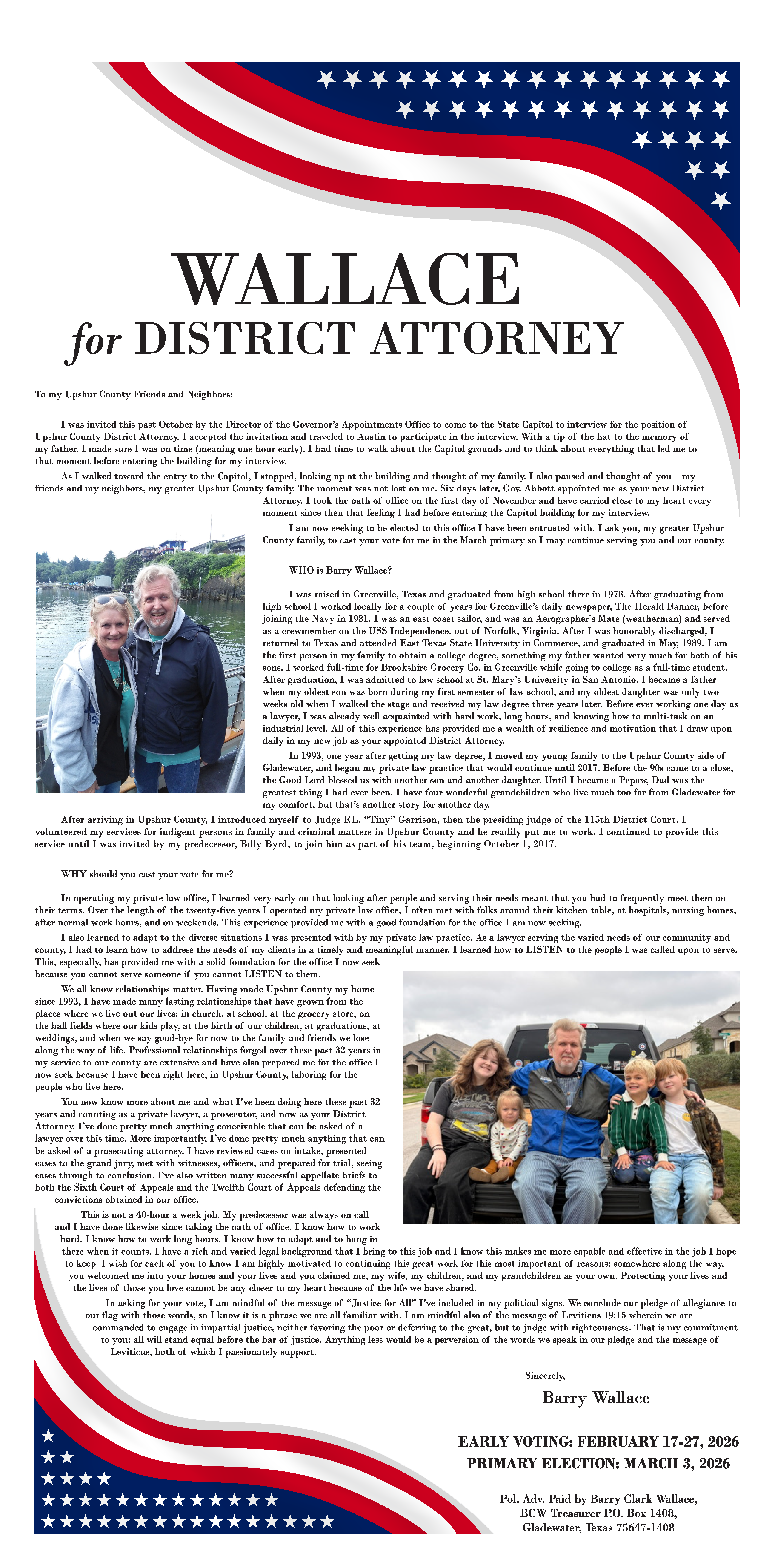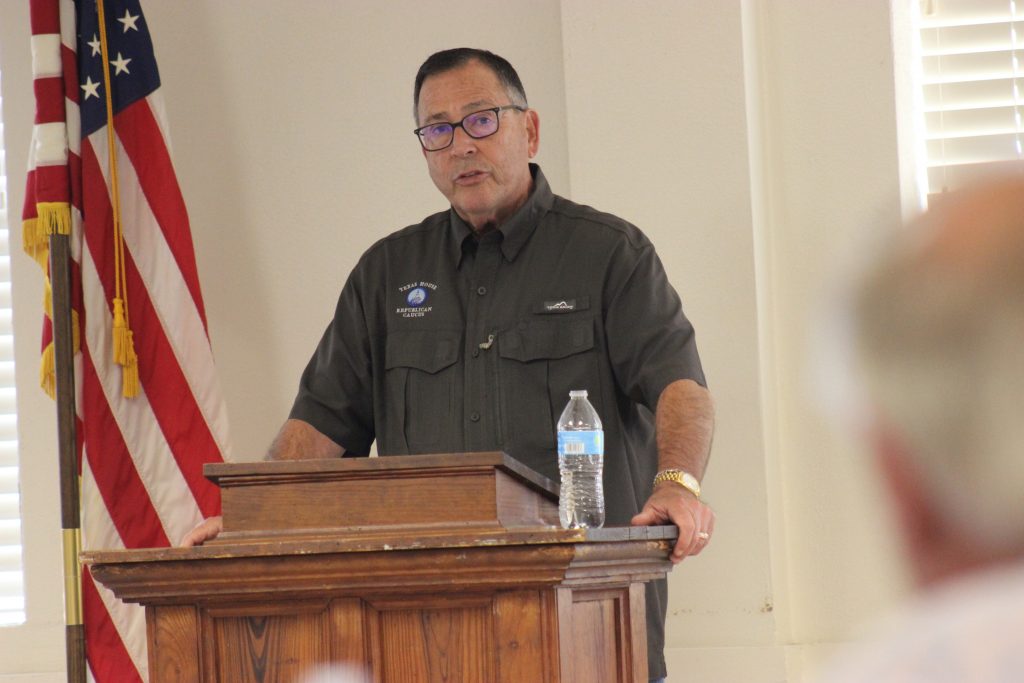“I want to talk about education to start with.”
District 7 Rep. Jay Dean didn’t stray far from the topic of Texas schools Aug. 16 during a local Town Hall meeting with Gladewater Rotarians, Lions Club members and others.
“Where do you think the State of Texas – the home of a world-class economy, the eighth largest economy in the world – where do you think we rank in school funding? Where should we rank?” Dean asked. Among the United States, “We rank 42nd – 42nd.
“If we want to have a world-class economy, we’ve got to have a world-class education system.”
Hosted by Gladewater Chamber of Commerce in First Methodist Church’s Jeter Hall, Dean’s lunchtime talk focused on bringing a massive, necessary overhaul to the Texas education system – no more munching around the edges of the problem instead of fixing it, he says. There aren’t any rational, common sense, conservative business people in the state legislature, Dean lamented, but Texans know it’s time to truly invest in education.
“Y’all, when Mississippi is outperforming us in reading and math and science, tell me what’s wrong with that picture. ‘Cause they’re investing in their kids and their parents and their teachers,” Dean said, and Texas must do the same. “We need to start with this clean piece of paper and we need to sit down and define what a world-class education system looks like. It’s going to take several sessions to do this. We’ve got to quit kicking this can.”
This session, Dean joined other lawmakers in a vote to underscore the constitutional restriction against using public dollars for private schools.
In the ongoing debate about school choice, vouchers and Education Savings Accounts, “Somewhere along the line, I think the governor got some bad advice,” Dean said. “They’re worried about this voucher program fixing Houston, Austin and other big cities. They always want to throw rural areas in with those major city areas where all the problems are…
“It’s not a good program, it’s not a fiscally-sound program. We can’t fund the vouchers anymore. ”
Moving students out of public school to private school isn’t going to solve all their problems.
“We have school choice now,” Dean said. It comes at the ballot box, where voters choose the elected officials who will guide their school districts at the local level. Otherwise, “Whenever the economy goes south, where’s the first place the state goes? The public schools.”
Lawmakers and state leaders talk local control, but they don’t ‘act’ local control, he added.
Meanwhile, “We want our teachers and our principals and our superintendents to babysit our kids, but we don’t want to pay for it. We need to pay our teachers as professionals. We’re losing teachers that are moving over to the nursing area. We need to fundamentally change and properly fund education.”
Come November, Texans will vote on the legislature’s move to increase the local homestead exemption from $40,000 to $100,000. It happened last in May 2022, when voters approved an increase from $25,000 to $40,000 (after a previous vote increased the exemption from $15,000 to $25,000 in 2015).
How is that going to affect cities and schools when they build their budgets next year? It represents a massive cut in municipal and school revenues.
It’s also retroactive, Dean answered, going back to the beginning of calendar year 2023.
The representative had no specific answer.
“There’s lots of details,” he said. “We’ve got to figure out how this is really going to work within two years.”
Before the November vote comes, Dean added, the legislature is already bound for another special session called by the governor this fall.
“How much money could the State of Texas save if the federal government was doing their job at the border?” attendee John Bisese asked
“Since I’ve been there,” Dean said, “since 2018, we’ve spent over $20 billion. At least. And it ain’t stoppin’. They ain’t fixin’ the board until they fix the entire immigration system. And nobody wants to do that. They love kickin’ the can.
“We like getting things done in Texas. They don’t. Until they get the immigration laws and rules straightened out, we’re going to continue trying to protect our borders.”
Gladewater Economic Development Corporation Executive Director Michelle Palmer asked how the state’s leaders are working to enhance the labor pool.
“Workforce is very much on our minds,” she said. “We’ve been partnering with the ISD for some time to be able to help develop that talent to go into the workforce, but what we keep running up against is TEA doesn’t support the programs we need for the local workforce.”
Dean – who advocates to make the state superintendent of Texas schools an elected position instead of appointed – agreed the state as a whole needs to account for the large portion of high school graduates who don’t pursue or finish college.
“We’ve got to put them to work. We’re trying to get into the nuts and bolts of job skillsets and other professions,” he said. “We have to redesign our public education system to include workforce development.”
That’s not the sentiment at TEA, Dean added: “They have no sense of urgency there. That’s a bureaucratic nightmare.”









